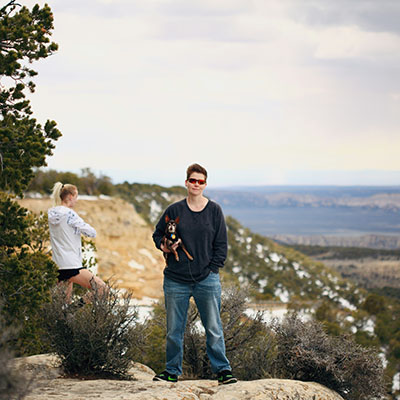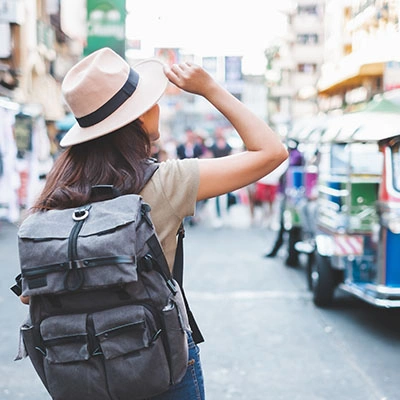You have the travel bug (the good kind, not the quarantine kind), but something’s holding you back. For some women, it’s a lack of courage. What if I get lost? What if I get lonely? Is it safe?
The answers are simple. If you get lost, ask for directions. Or enjoy the spontaneity of wandering aimlessly.
If you get lonely, join a group for a walking tour of the city or chat with the waiter at the café.
If you’re worried about your security, follow this practical safety advice for traveling alone as a woman.
How Safe Is It for a Woman to Travel Alone?
It’s unfair, but to be honest, traveling alone as a woman is no more or less safe than staying home. Some of the most common dangers during a trip are harassment, assault, and having your belongings stolen — all things that can happen in your own backyard.
By being prepared, staying aware of your surroundings, and doing your part to avoid unnecessary risks, you can travel safely almost anywhere in the world.
One last word of advice before we get to our safety tips: Being safe is not necessarily the same thing as feeling comfortable. Some of the most epic travel memories come from what we accomplish when we step outside our comfort zone. Be smart, but don’t be afraid to let go a little, too.
Women’s Safety Travel Tips
1. Join an online group.
There are countless Facebook groups and websites that cater to female travelers. These communities are chalk-full of travel hacks and destination ideas for your next trip. You might even make a few new friends you can meet up with for dinner or an excursion if you’re looking for a short-term travel buddy during your independent trip.
Popular online groups for female travelers include Girls LOVE Travel and Digital Nomad Girls Community.
2. Pack light.
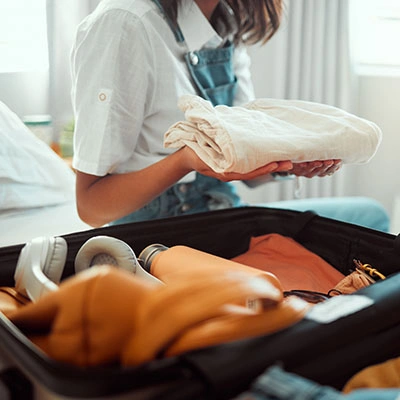
Need to get out of a crowd quickly? You can do that if all you have is a backpack, less so if you have two rolling suitcases. Don’t trust a cab driver to load your luggage? You won’t have to ask for help if you packed light enough to toss your bag in the back seat with you rather than needing help to lift it into the trunk.
3. Leave valuables at home.
If you’re traveling for a wedding or a fancy gala, of course you’re going to pack something that makes you feel beautiful. Try not to flaunt your jewelry and expensive accessories, though, unless you want to be targeted by pickpockets.
When you don’t need luxurious items, leave them at home. This includes electronics and high-end bags and clothing as well as jewelry.
4. Research common local scams and risks.
Unfortunately, con artists come in many disguises, from locals who insist on being your guide to schoolchildren who beg you teach them English or want to sell you a postcard.
Before departure, check out review sites or the U.S. Department of State to find out what the most common types of crime are. Sometimes it’s petty theft or cab drivers that always take you the longer (and more expensive) route. Other times it can be more serious. Knowing what to look for is the first step toward keeping yourself safe so you can enjoy your trip.
5. Splurge for safety.
Oftentimes a travel deal is inexpensive for a reason. The hotel might be in a less desirable part of town. Or the restaurant doesn’t have the cleanest reputation.
Especially if you’re traveling alone, paying a little extra for accommodations that keep you safer is worth it. Splurge for the Uber instead of walking, upgrade to the hostel with personal lockers for your money and valuables, book the more reputable tour guide.
6. Read reviews.
Picking the safest place for female travelers usually comes down to research and reading reviews. Even after you’ve chosen a destination, keep reading to find preferred hotels, restaurants, and excursions from women who travel with the same style as you.
Sometimes the best advice comes from people who have been there before. If all the reviews are saying the same thing, it’s probably a tip you can trust.
 7. Learn the local language.
7. Learn the local language.
Knowing how to speak at least some of the local language can help you to be more independent and advocate for yourself when necessary. You don’t need to be fluent; just learn the basics. When you’re in a pinch, you can always use Google Translate or a translation travel app. It won’t be perfect, but it’s better than nothing.
Don’t overlook non-verbal communication, too. Hand signals mean different things in different cultures. The OK sign — thumb and forefinger together with last three fingers sticking up — is an indication of agreement or excitement in the U.S. In France, though, you’d be telling the other person they’re a zero or worthless. Direct eye contact is a sign of respect in the U.S. but is considered rude in Japan. You don’t want to insult your hosts because of a simple misunderstanding of body language.
8. Know what to do in an emergency.
You might not know what will happen, but you can plan how you’ll respond if something does. Learn emergency phone numbers at your destination — it's 911 in the U.S. but 112 in Europe and 999 in the United Kingdom — for example.
If you have travel insurance from Seven Corners, you have access to 24/7 emergency travel assistance services. The Seven Corners Assist team can help you find medical care, arrange translation services for urgent situations, provide guidance on what to do if you lose your passport, and more. How to contact us will be on your travel insurance ID card, but it wouldn’t hurt to program the number into your phone before you leave home, too.
9. Get travel insurance.
Whether for lost baggage, canceled flights, or emergency medical treatment, travel insurance can help you. Choose a travel insurance company that also provides 24/7 emergency travel assistance services with their plans.
10. Be aware of your surroundings.
Some of the best safety advice for female travelers is simply paying attention to your surroundings. Some people call it trusting your gut. Others might say it’s a woman’s intuition. However you label it, though, being aware of what’s happening around you can help you avoid some sticky situations.
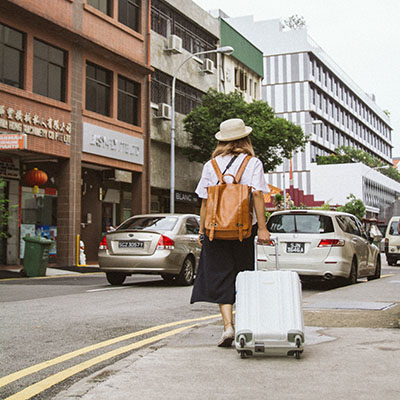
Recognize when someone’s paying too much attention to you or your stuff. They might be staring too long at you from across the café (and not just because you’re gorgeous). Or maybe this is the third museum you’ve seen them at.
Know where your belongings — luggage, phone, drinks — are. Don’t leave them unattended or with a stranger, even if they look really nice.
11. Arrive in the daytime.
Try to book your flight so that you arrive at your destination during the daytime. It’s much easier — and safer — to get settled in daylight. You’ll be glad you started to familiarize yourself with your surroundings before you’re alone in the dark in an unfamiliar location.
12. Take a walking tour when you arrive.
To get oriented to your destination, consider signing up for a walking tour on your first day. You’ll have a local guide to show you the key spots in the city and help you get the lay of the land.
It’s also a perfect opportunity to ask for advice like where to go, where not to go, or favorite local restaurants. You might also meet a fellow traveler you’d like to pal around with for a bit, which is ideal if you’ve been on your own for a while and are feeling a bit lonely.
13. Check in regularly.
Especially if you’re traveling alone, make plans to check in with family or friends regularly. They’ll be glad to hear you’ve made it to your destination safely. And if something happens to you and they don’t get that text as expected, they can step in to help.
If texting or emailing someone back home every day sounds like a drag, there are other ways to stay in touch, lazy-girl style. If you Uber, use the feature that allows you to share your trip status. iPhones will allow you to share your location with other iPhone users of your choice — permanently or for a specified time — so they can check on you even while you’re busy having fun. If you don’t have an iPhone, download an app like Life360.
14. Make friends.
Book a day tour, take a class, or chat with someone at your hostel over breakfast. If you’re alone at a restaurant or bar, have a friendly conversation with your server. By making a friendly acquaintance, you’re reducing the risk that you’ll be targeted as a lone traveler.
If you make friends with a local who asks you to go to a restaurant or bar, it can be safer to go somewhere of your choosing.
15. Be careful what information you share.
Loose lips sink ships, or so they said during World War II. Take that concept with you when you travel alone. Not everyone needs to know where you’re staying or where your next dinner reservation is. Go ahead and talk about your trip, but be careful what specifics you share.
It also helps to know how you’ll answer the common question, “Are you here alone?” When I was traveling solo in Mexico, I often got asked if I had a boyfriend. Sometimes you could tell they were just practicing their English and making conversation. But I was always wary of that question from a cab driver when I was already in his car. Too many things could happen that were out of my control.
So I developed a stock answer that yes, I had a boyfriend, and I was on my way to meet him and a group of friends. It explained why I was alone in that moment but that I would be missed if they tried anything unwelcome.
Have a few answers prepared if people start asking too many questions and remember that not answering is an acceptable response.
16. Dress culturally appropriately.

This is not dating advice. Some countries and sites have cultural rules about the types of clothing that are appropriate. For example, the Vatican does not allow low-cut or sleeveless dresses, miniskirts, or shorts.
Dressing appropriately for the culture has a few benefits. First, it makes you a savvy and culturally sensitive traveler. Second, you’ll be able to see and do everything you want. No one wants to get all the way to the Vatican just to be turned away because they didn’t have a wrap or sweater to cover their shoulders. And finally, if you dress immodestly by local standards, you could draw unwanted attention, increasing your risk of an awkward or even dangerous situation.
17. Keep an eye on your drinks and food.
You should be practicing this at home, not just when you travel. We’re sure you’ve heard it before, too, but it’s important enough that it bears repeating. Don’t leave your food and drink unattended, even if you have to use the ladies’ room.
It also helps to know what a drink looks like if it’s been tampered with. You can’t always tell if a drink has been spiked, but if it’s not the right color or has turned foggy or cloudy, is bubbly (and shouldn’t be), or doesn’t taste right, don’t drink it.
18. Know your limits and stay in control.
Food and drink are important parts of culture, and indulging in them is one of the best parts of travel. Even as someone who isn’t a beer drinker, I still had to give it a try at Munich bierhaus.
Just make sure you aren’t overindulging in alcohol (or other substances) so that your judgement is impaired. It’s hard to stay aware of your surroundings and in control of a situation when you’ve lost control of yourself.
19. Look like you know what you’re doing.
Lots of women are worried about standing out in a foreign city, particularly if they’re traveling alone. If you look lost or confused, that can be a sign to observers that you’re not from around here.
Do your research to help with some of this. You can look up directions to attractions before you leave home. When I traveled to England on my own, I knew I wanted to go to the British Museum. But because I was nervous about my first solo international trip, I wrote down step-by-step directions and tube routes in a small, discrete notebook so I would know how to get from my hostel to the museum. All of this research happened in Pennsylvania, an ocean away from the streets of London.
Learn the names of common foods so you aren’t trying to translate the menu at the bar. Be able to identify currency easily so you aren’t fumbling over coins in the checkout line. Practice walking with your head held high and shoulders back. If you look confident and give the appearance you know what you’re doing, others are more likely to leave you alone. And who knows? You might start to actually feel confident, even if you start off just faking it.
20. Look for other women and/or families.
I’ve used this tip plenty of times when walking through town — at home and while traveling — on my own. Look for a family or group heading in the same direction to latch on to. They don’t even have to know you’ve joined them, but by tagging along, you can give the appearance you’re part of the group, making yourself less of a target.
This is especially helpful when traveling at night. Use it while waiting for your luggage at airport baggage claim, standing in line at a bar, or at some attractions, too.
21. Be smart about money.
Get familiar with local currency before you arrive. If you need help withdrawing money at an ATM, ask for help from officials rather than the person who just happens to be standing nearby. For an added layer of safety, look for ATMs inside the bank instead of on the street.
Keep money stored in secure places, whether that’s inside your shoe, tucked in your bra, or even inside an unused tampon applicator (no one wants to steal a tampon).
22. Get enough sleep.
You’ve probably not thought about how getting enough sleep can keep you safe. When we’re well-rested, we make smart decisions and we’re more aware of our surroundings. Sleeping well also helps our immune system, and no one wants to get sick on vacation.
23. Be polite.

Politeness is defined differently in other cultures, but trying to speak in the local language rather than assuming everyone should speak yours, and saying “please” and “thank you” are always good places to start.
24. Know how to get loud.
While you’re more likely to make friends by being polite, sometimes you need to be left alone. If someone is making unwanted advances, trying to grab your luggage, or making you feel unsafe, don’t be afraid to make a scene. Call for help, wave your arms and make yourself appear larger, get noticed. That can sometimes be enough to make the other person go away and attract help from someone friendly.
Safety Items for Solo Female Travelers
Dummy wallet
You never want to put all your money in one spot. If you do get pickpocketed or mugged, having a dummy wallet or other decoy device usually means the thief doesn’t get all your money and credit cards. Keep the dummy wallet in your purse or backpack and the rest of your valuables in a hidden money belt or someplace else safe.
Personal alarm
If someone tries to assault you or you need assistance, a personal alarm can alert others nearby. We prefer the alarm over pepper spray when we travel. It’s illegal to carry pepper spray or mace in some countries. Many places in Europe consider it a concealed weapon. So rather than getting detained for having an illegal substance, stick with an alarm that just makes a lot of very loud noise.
Doorstop alarm
A doorstop alarm can improve safety in a hotel. Stick it under the door when you’re in your room to help prevent intruders from breaking in. Some women find they sleep easier at night knowing they have that extra layer of protection.
Flashlight
Flashlights are good for both safety and convenience. Even a miniature flashlight not only helps you stay sure-footed and see what’s happening around you when you’re walking at night.
It's also helpful in a power outage or other situation where you might need to evacuate your immediate area after dark. Being able to see can help you navigate an unfamiliar location much more easily and safely.
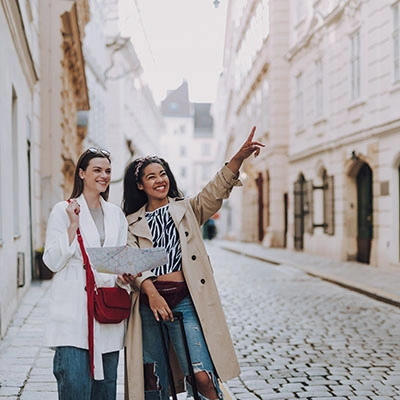 Slash-proof day bag
Slash-proof day bag
Choose backpacks or cross-body bags that are difficult to steal. They should be made from material that can’t easily be cut. Some even have slash-proof wire in the fabric. Zippered pockets are ideal, too, since those are difficult to get into without being noticed.
When in a crowded area, wear your bag on the front of your body where you can see it easily. While no bag can guarantee that you won’t be pickpocketed, the right one can be a huge theft deterrent.
Luggage you can carry yourself
Cobblestone streets, steep paths to a hilltop hotel, old hotels that don’t have elevators. All of these things make rolling suitcases difficult, which is why having a good backpack that you can easily carry yourself is a huge plus. It’s also why I will never take a roller bag to South America.
If you do take a rolling suitcase — maybe you’re traveling with a disability and carrying luggage isn’t a realistic option — make sure you can still handle it on your own. You’ll be less reliant on strangers and able to move around more independently, both positives when you’re improving your safety as a female traveler.
First aid kit
You can buy a dedicated travel first aid kit, designed to be nice and compact with the essentials for minor illness and injuries. You could even make your own. Stock a small makeup bag with a few basics.
- Any medication you take on a regular basis. Pack more than you think you’ll need for your trip in case your return is delayed. Carry them in their original containers with clear labels and documentation if you’re crossing international borders.
- Antibiotic cream and/or antibacterial wipes
- Bandages of varying sizes
- Aspirin or ibuprofen for headaches and other pains or fever
- Antihistamines for allergies
- Anti-itch cream
- Antacid and other medication for upset stomachs
- Gauze and tape
- Round-tipped scissors
- Tweezers
- Water purification tablets
- Disposable rubber gloves
If you're traveling internationally, research your destination’s rules about bringing medication into the country. Some places are more restrictive than others and even something as simple as diarrhea medication could be confiscated.
Travel Insurance for Female Travelers
When you’re taking all the right precautions to travel safely and smartly, travel insurance can help. Travel insurance can protect the money you spend for your trip, your belongings, and your health, as well as provide you with non-insurance benefits like travel assistance services. Without it, you could find yourself losing out on your hard-earned money, unable to pay for medical care if you get sick or hurt while traveling, or feeling unsure and alone in an emergency.
Take the next step in staying safe by answering a few questions about your trip in our quick quote tool. We’ll help you find the right plan and show you all the options so you can customize your coverage to fit your needs and budget. If you need more help, contact our licensed travel insurance agents.

